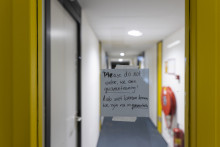‘The system assumes that parents can contribute’, says Arjan Vliegenthart, director of the National Institute for Family Finance Information. ‘But even with a family income around one-and-a-half times the national modal average, that’s still very hard for them.’
Nibud surveyed more than 1,500 students in both vocational and academic higher education. Most (68 percent) receive money from their parents. That is 15 percentage points higher than in 2015, when there was still a basic study grant. The amount they receive has also increased: in 2021 it averages €211 per month.
Inequality of opportunity
But parents earning one-and-a-half times the modal average – that is, with a monthly net disposable income of €3,751 – have trouble finding the money for that contribution, Nibud claims, whilst their children receive almost no supplementary grant.
The conclusion is that this results in inequality of opportunity. Some students need to borrow nothing, whereas others end up in substantial debt. The recommendation to politicians: give students an income which allows them to be financially independent.
Nibud conducted the same survey four years ago and says some of the developments since are positive. For example, students find it easier to make ends meet now than they did in 2017. They are also less likely to run short of money. And slightly fewer than in 2017 have loans, although these are still more than in 2015, when basic grants were still available.
New basic grant
National student organisation ISO has been waiting for months for the results of this research, which forms the basis of its own proposal for a new basic study grant. That calls for a monthly payment of €247 for students still living at home, or €460 for those living independently. ISO also wants to ‘broaden’ the supplementary grant so that students from middle-income families with annual earnings of up to €70,000 can claim it.
Finally, ISO is demanding compensation for the generations of ‘unlucky’ students who fall under the current loans-based system. It says they should receive a lump-sum payment – of an amount to be determined – as well as cancellation of their outstanding student debt.
Invoices
To press home its demands, ISO has launched an ‘invoice your studies’ campaign. On the organisation’s website, students can calculate how much they have missed out on in grants under the current system and compile an invoice for that amount. At the start of the new academic year, it will hand in all those invoices to politicians in The Hague.
Dutch Student Union LSVb and trade union FNV Young & United have also had enough of loans; they are instead demanding a ‘debt-free’ basic grant which will allow students who work twelve hours a week to graduate without having to borrow anything extra. In addition, like ISO they want full compensation for the ‘loan-system generation’.
Nights out
Although students are increasingly financially dependent upon their parents, according to the Nibud survey their main sources of income are still student finance and part-time jobs. Each month, these bring in €526 and €508 euros, respectively.

© HOP. Source: Nibud.
But being a student is not a free ride, so that money is soon spent. Rent (or board for those still living at home) and tuition fees remain the biggest outgoings. Next in line is leisure spending, including nights out, meals and holidays. Students have been spending slightly less on these items in 2021 than they did in 2017 – according to Nibud, probably due to the coronavirus crisis.

© HOP. Source: Nibud.






